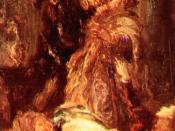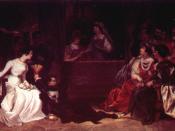What Heroes are Made of Ever since I watched my first episode of Baywatch I have always wanted to be a lifeguard. They save people and risk their own lives for another person's safety. I would read stories in the magazines and newspapers of heroes and had them inspire me to dream of one day becoming a hero for someone else. Holding the desire of our hearts, the goal of our dreams, and the answer to our prayers, heroes are our idols. As humans we long for the attention and courage of admirable people. We yearn for the nobility that fearlessness and strength under trial most certainly receive. The kind of heroic representation depicted in Shakespeare's Hamlet opposes the idealized vision we, as Disney movie watchers, have instilled in our minds. Hamlet, the tragic hero that Shakespeare paints, is passionate about his purpose, witty in the procession of his project, careful in the details of his plan, yet is sentimental in the distribution of his vengeance.
One of Hamlet's greatest strengths in avenging his father is the passionate initiative he assumes at the startling words of his father. Ex. He tells his father (ghost) to tell him how he was killed and who did it so he can bring justice as swiftly as possible. Hamlet, awaiting the story of his father's death, tells the ghost "Haste me to know't, that I, with wings as swift as meditation or the thoughts of love, may sweep to my revenge" (Act I Scene V lines 29-31). Hamlet consumes himself with the task of killing his uncle Claudius and makes it a commandment to "live within the book and volume of [his] brain" (Act I Scene V lines 102-103). Hamlet's driven spirit relates to the heart of a hero. Lifeguards, for example, have to be aware and passionate about their job. At the sound of a cry for help lifeguards are on their feet in a hurry to rescue a life. They do not think twice about approaching the victim, but instead they instinctively put themselves in danger so that others may be brought to safety. Their own lives take the back seat while the life of another is given priority. Reasoning has little room to lure itself into the minds of heroes in times of crisis. Heroes quiet the voice of personal reason in carrying out their duties because it goes against heroic virtues such as honor and dignity. Although Hamlet's father may already be dead, Hamlet pursues the peaceful rest of his father's ghost knowing that his murderer is brought to justice. Lifeguards are driven because they know the importance of their job just like Hamlet sees the significance in avenging his father's death; it is loyalty, justice, love and reverence for his father that Hamlet is desperately seeking.
Another one of Hamlet's strengths is his wit that he so cleverly uses in approaching King Claudius with his fatal destiny. Hamlet tells the ghost of his father that he will swiftly carry out the execution of his murderer. Having little time to think of a well devised plan to trap King Claudius and perhaps kill him, Hamlet uses his witty words to slowly end Claudius's life taking every opportunity he can to verbally but subliminally torture the current king. An example of Hamlet's creativity is his plan to put on a play for the king that will reenact the circumstances of his father's death. Like a speeding bolt Hamlet surmises the idea that "the play's the thing wherein [he'll] catch the conscience of the king" (Act II Scene II lines 556-557). Similar to Hamlet's heroic attribute of being able to think critically and creatively make a plan to carry out his mission in little time, lifeguards do the same. At the moment of a rescue time is critical and being able to find quick solutions to the problem is vital. Although Hamlet's direct actions towards his father's vengeance do not take place till the very end of the play, Hamlet demonstrates that he is ready with words and piercing schemes to visually see pain in Claudius as long as he remains alive. Lifeguards are given different situations to help with. A victim may not necessarily mean that the person is drowning in the water, but rather that a baby is choking on sand that he/ she was not supposed to be eating. Critical seconds of the baby's breath is at stake and heroes make the best decisions under intense pressure.
Still another one of Hamlet's strengths is his ability to deceive others with his seemingly calm and sobered state of mind. Hamlet, as hard as it may be for him, does not lash out against Claudius and expose his evil deed to the world. Instead, Hamlet chooses a different way to deal with the situation. When tempted to speak against his mother and uncle/ stepfather, he says to himself, "But break, my heart; for I must hold my tongue" (Act I Scene II line 159). Hamlet does not feel the need to let the world know of his feelings towards his earthly family; he is only concerned on carrying out the promise he made to his father, the late king. Similarly, heroes do not allow their emotions to show. When they are in a situation that gives cause to fear, they do not allow their scared emotions to show. Appearing strong and bold is comforting to the audience and of course to the victims who are being rescued. The tasks that heroes undertake are never nearly as frightening in the heroes' depictions as they are in real life.
Although Hamlet carries certain qualities that are commonly found in everyday heroes, Hamlet's character flaw of sentimentality leads him to his physical death and the end of his short-lived victory over Claudius. Being passionate is different from allowing your emotions to interfere with your focus. Passion is caused by a great sense of understanding your purpose where as emotions are caused by a misunderstanding of purpose along with the fact that they serve no purpose. Passion can make someone or something better; it makes an argument stronger and a focus worth more. Emotions do not. Although emotions can expose the hearts of people, it can bring them to a fall. Emotions are fleeting messages that our bodies give us, but passion derives from heart-felt convictions. Hamlet allows his emotions to stop him from killing Claudius sooner. His fear and trust in sentiments lead him to believe that the disillusionments are true. When Hamlet gets the chance to kill Claudius while he is praying, he stops himself from doing so. He has pity on the man who prays to God and at the same time does not want Claudius to go to heaven if he were to kill him in the moment of his close connection with God. Although this circumstance is excusable because of Hamlet's logic in abstaining from killing him in that particular moment, the fact that he had not killed Claudius already leads the reader to believe that he would not have killed Claudius at that moment even if he were not to be praying. Hamlet does not follow up on his commitment to his father to make his vengeance as swiftly as possible until the end of Act III when he is speaking to his mother and accidentally kills Polonius hoping that it might have been Claudius behind the curtain. But even then, when Hamlet killed Polonius, he did that out of his emotions and that can be a dangerous thing. Emotions can mold the decisions we make and sometimes those decisions are huge. Sentiments, as real as they are felt, cannot be relied upon. Heroes have emotions, but they are not driven by them. If a lifeguard had to save a drowning child who was knocked unconscious, but could not give the child artificial breath because his crying mother could not stand to see or even think of her baby son be treated as a dieing victim, the lifeguard's job is taken from him. Emotional acts affect the individual along with those around him/ her. As a girl it is difficult to deal with emotions. I have to figure out what is true and what is notâ¦who do I like for 10 seconds or who do I really like? Anyone can be a hero. They may not end up on the cover of newspapers or magazines or even be able to play a hero on a hit tv show, but people can learn to be passionate about their purpose through its understanding, learn to be quick to think under serious circumstances, and learn to remain calm and steadfast strong for others so that they will not lose hopeâ¦the latter one being what true heroes are made of.





